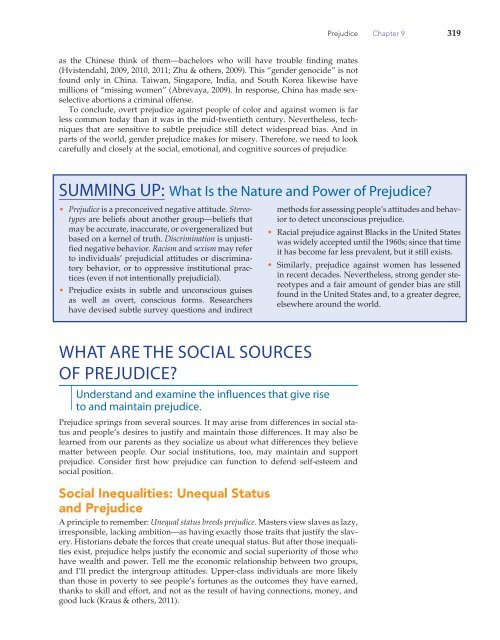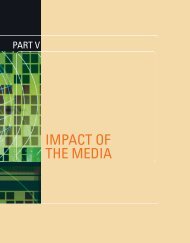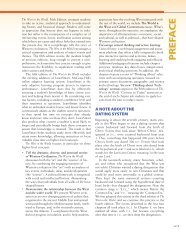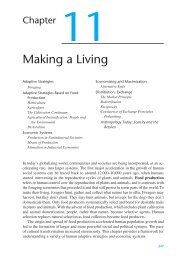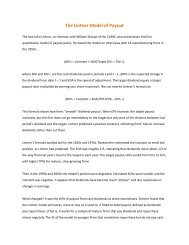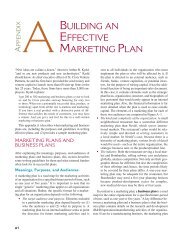Chapter 9: Prejudice: Disliking Others (2947.0K) - Bad Request
Chapter 9: Prejudice: Disliking Others (2947.0K) - Bad Request
Chapter 9: Prejudice: Disliking Others (2947.0K) - Bad Request
Create successful ePaper yourself
Turn your PDF publications into a flip-book with our unique Google optimized e-Paper software.
as the Chinese think of them—bachelors who will have trouble finding mates<br />
(Hvistendahl, 2009, 2010, 2011; Zhu & others, 2009). This “gender genocide” is not<br />
found only in China. Taiwan, Singapore, India, and South Korea likewise have<br />
millions of “missing women” (Abrevaya, 2009). In response, China has made sex-<br />
selective abortions a criminal offense.<br />
To conclude, overt prejudice against people of color and against women is far<br />
less common today than it was in the mid-twentieth century. Nevertheless, techniques<br />
that are sensitive to subtle prejudice still detect widespread bias. And in<br />
parts of the world, gender prejudice makes for misery. Therefore, we need to look<br />
carefully and closely at the social, emotional, and cognitive sources of prejudice.<br />
SUMMING UP:<br />
• <strong>Prejudice</strong> is a preconceived negative attitude. Stereotypes<br />
are beliefs about another group—beliefs that<br />
may be accurate, inaccurate, or overgeneralized but<br />
based on a kernel of truth. Discrimination is unjustified<br />
negative behavior. Racism and sexism may refer<br />
to individuals’ prejudicial attitudes or discriminatory<br />
behavior, or to oppressive institutional practices<br />
(even if not intentionally prejudicial).<br />
• <strong>Prejudice</strong> exists in subtle and unconscious guises<br />
as well as overt, conscious forms. Researchers<br />
have devised subtle survey questions and indirect<br />
<strong>Prejudice</strong> <strong>Chapter</strong> 9 319<br />
What Is the Nature and Power of <strong>Prejudice</strong>?<br />
WHAT ARE THE SOCIAL SOURCES<br />
OF PREJUDICE?<br />
Understand and examine the influences that give rise<br />
to and maintain prejudice.<br />
<strong>Prejudice</strong> springs from several sources. It may arise from differences in social status<br />
and people’s desires to justify and maintain those differences. It may also be<br />
learned from our parents as they socialize us about what differences they believe<br />
matter between people. Our social institutions, too, may maintain and support<br />
prejudice. Consider first how prejudice can function to defend self-esteem and<br />
social position.<br />
Social Inequalities: Unequal Status<br />
and <strong>Prejudice</strong><br />
A principle to remember: Unequal status breeds prejudice. Masters view slaves as lazy,<br />
irresponsible, lacking ambition—as having exactly those traits that justify the slavery.<br />
Historians debate the forces that create unequal status. But after those inequalities<br />
exist, prejudice helps justify the economic and social superiority of those who<br />
have wealth and power. Tell me the economic relationship between two groups,<br />
and I’ll predict the intergroup attitudes. Upper-class individuals are more likely<br />
than those in poverty to see people’s fortunes as the outcomes they have earned,<br />
thanks to skill and effort, and not as the result of having connections, money, and<br />
good luck (Kraus & others, 2011).<br />
methods for assessing people’s attitudes and behavior<br />
to detect unconscious prejudice.<br />
• Racial prejudice against Blacks in the United States<br />
was widely accepted until the 1960s; since that time<br />
it has become far less prevalent, but it still exists.<br />
• Similarly, prejudice against women has lessened<br />
in recent decades. Nevertheless, strong gender stereotypes<br />
and a fair amount of gender bias are still<br />
found in the United States and, to a greater degree,<br />
elsewhere around the world.


